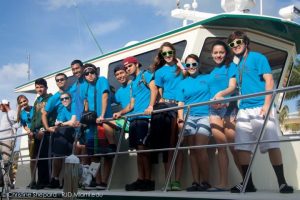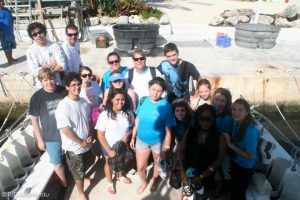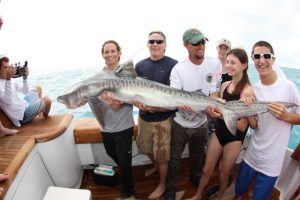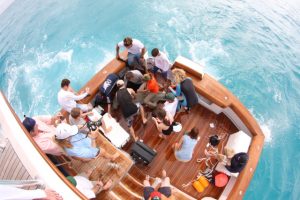A Familiar Surprise!
Thursday, May 10th
by Laurel Zaima, RJD intern
It’s time to celebrate! Exams are finally over, and summer has officially started! What better way to kickoff summer 2012 than going on an exhilarating and action-packed shark tagging trip. After an early morning, 2 hour drive down to Islamorada, all of the RJD interns took a second to stretch and got right to work. Captain Curt notified us that we will be adding 100 foot extensions onto the already existing 100 foot long drumlines (the fishing gear that we use to catch the sharks), which means we will be going to the deep water reef (125-145 foot depth). I was extremely excited because last time we went to this fishing spot we were extremely successful!
After we brought all of the gear on the boat, all we had to do was wait for the rest of our group. We were taking out some gentlemen that were members of the bonefish and tarpon trust fishermen and conservationist group, and Joe Romeiro, a filmmaker. Susan Gerrish, the RSMAS Assistant Director of Advancement, and Rose Mann, the RSMAS Assistant Dean of Advancement, also joined us on this excursion. The water was calm and the skies were clear; the only thing that could have made this trip any better was if my mom and brother would have been able to join us. They both drove down to Miami from Michigan to help me move all my stuff back home for the summer, and they had hoped that they would be able to shark tag with me before we made our long trek back. Unfortunately, family members are not allowed on most trips because other groups are scheduled for that trip already scheduled to take out another group.
Little did I know, everyone was playing a trick on me. As we organized the gear, I turned around only to see my mom and brother start boarding the boat. I was completely shocked! Susan Gerrish and Dr. Neil Hammerschlag had secretly talked to my family and planned for them to come on the boat without telling me. I was overjoyed and extremely pumped because I could finally show my family the work and research that I do for the RJD program. It was going to be a perfect day!






